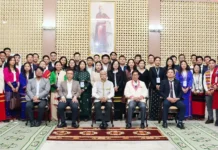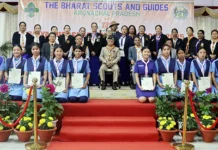[ Dr Hage Tabyo ]
If you happen to walk outside on a clear and dark night, and look up to the sky, you can see the stars in their hundreds and thousands. Did you ever consider the situation that if it were not for the darkness of space the starlight would never be revealed to us on this earth?
We are inclined to think of anything dark or black as bad, not as valuable as white or light. Or we perceive black as nothing at all, for it has no colour (except darkness), it’s the absence of light – it could be called an illusion or invisibility. But every time you go to a movie hall/theatre, you know how important it is for the room to be very dark, for that’s only when the picture can be seen most clearly.
Perhaps the symbolism of enlightenment, steadiness and strength within each one of us human beings, our divine purpose or potential, also has a dark background against which it becomes illumined – not a destructive or negative image of darkness but an obligatory foundation of strength and steeliness. And perhaps this darkness is humility: our ability to admit that we can never know everything or be all things to all people.
Humility is not self-deprecation. To believe that you have no worth, or were created somehow flawed or incompetent, is equivalent to be living in a fool’s paradise. Humility, I should say, is wisdom. It is knowing that you were created with special talents and abilities to share with the world, but that you are one of many, each with an important part to play in life. Humility is knowing that you are smart but not all-knowing. It is accepting that you have personal power but are not omnipotent.
Just as a tree needs a strong root system to grow tall, or a skyscraper needs a deep foundation to hold strongly against stress and external pressures, we need the strength of humility to reach our extreme height. It is what we possess inside that will serve as our foundation and help us challenge life and take risks. We have unlimited potentials to create ourselves, but it must be rooted in the knowledge and understanding of the limits of our personal power or capability, and inculcate appropriate knowledge inputs from external sources.
A humble attitude is a flexible one. Just as the tree and the building must sway with the wind, our agility in dealing with whatever life throws our way will be our strength. Inherent in humility is an open and receptive mind. We not only don’t know all the answers but sometimes not even the right questions have been revealed to us. Humility is a strength that serves us well; it leaves us more open to learn from others and to refuse to see issues and people only in black and white.
The opposite of humility would be arrogance – the belief in the thought that we are wiser or better than others. Arrogance tends to promote separateness rather than unification and harmony. It looms like a brick wall between us and those from whom we could learn. An example would be Virginia Smith, a young woman who was about to graduate from her college with honours. She had a very high opinion of herself and visions of greatness. As she came down from the podium in her cap and gown, she was carrying not only her diploma but an air of intellectual smugness and arrogance. Out of the crowd stepped an old woman. We can call her Wisdom of the World. She spoke to the young woman in a casual way, “Well, who have we here, this young gentle lady?”
“You evidently don’t know me,” said the young woman in an annoyed tone. “I am Virginia Smith, LLB, DLit…”
“Well, my young friend,” said Wisdom of the World with a chuckle. “Come with me and I will teach you the rest of your alphabet.”
This young lady graduate undoubtedly had a bright light to shine on the world. She had great potential for doing well, but she had yet to understand how much of life would be a mystery to her. How many would come her way as obstacles because of pure human hatred and animosity! To an arrogant and proud novice – if she could only gain humility, her ‘heavenly light’ would have surely shone. (The contributor is a former director of family welfare, GoAP)




